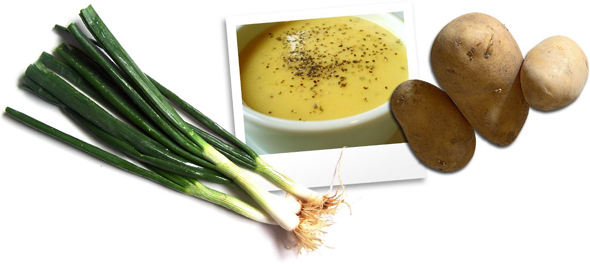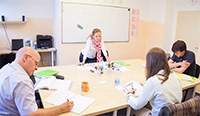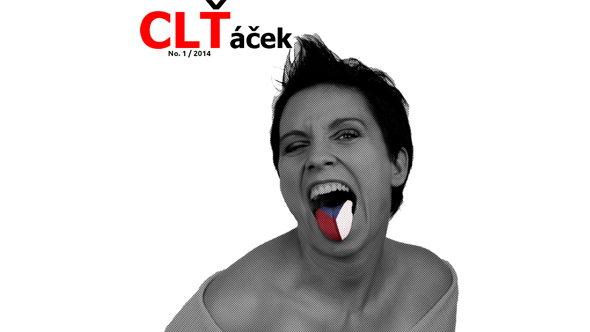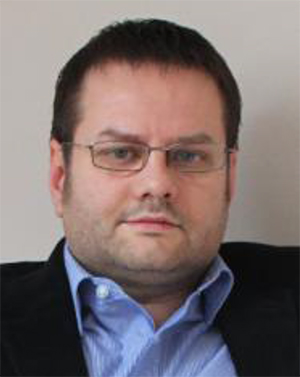RECEPT
Krémová bramborová polévka s pórkem
- 1 – 2 pórky
- 4 – 5 brambory
- ½ l vody
- 1 zeleninový vývar
- 1 – 2 dl smetany na vaření
Brambory oloupeme a nakrájíme. Pórek očistíme, omyjeme a nakrájíme na kolečka. Přidáme pórek a brambory. Přilijeme vodu a přivedeme k varu. Přidáme/zalijeme zeleninovým vývarem. Vaříme 15 minut. Rozmixujeme a přidáme smetanu na vaření.
Autorka: Emilia z Finska

Intensive holidays in CLT
 I am a full-time mum, which means that I work twenty-four seven. That´s why every year I look forward to my summer holidays, which I spend in intensive Czech language course in the Czech Language Training. For you to understand, I spend it actively, as a teacher. After all, why go to Spain, Turkey, Brazil or even Israel, when representatives of these cultures can come to you in Prague? (I really had all these nationalities in my class during the summer holidays.) And why look for last minute deals on the internet when your profession often conveys such last minute deal, and at a much better price?
I am a full-time mum, which means that I work twenty-four seven. That´s why every year I look forward to my summer holidays, which I spend in intensive Czech language course in the Czech Language Training. For you to understand, I spend it actively, as a teacher. After all, why go to Spain, Turkey, Brazil or even Israel, when representatives of these cultures can come to you in Prague? (I really had all these nationalities in my class during the summer holidays.) And why look for last minute deals on the internet when your profession often conveys such last minute deal, and at a much better price?
This year we were also lucky with the weather, a really intense one, but fortunately our classroom has two and more fans that evoke a sense of beach and ocean. And it becomes much better place to work. For these cases, it is very appropriate to include activities such as paper domino, memory game/pairs or composing a cut-up article. The demanding nature of these activities immediately climbs up a level when students try to put the pieces together while chasing them flying around the classroom. These activities are a real challenge not only for students but for teachers as well.
It is useful to adjust some basic phrases for the hot weather, which is not an exception during the summer courses. For example the question "How are you?" we teach students besides the answer „Okay." also "I'm hot.". Very important is the phrase: "I need some water.”, which most students mix up with the phrase "I need a beer." On very hot days, the students often call for a break using the phrase: "Please break." Yet this must not sway the teacher.
Let´s stop at the most frequent phrase "How are you?" Of course, at the beginning of the course students reply politely that they are well or even very well (regardless their stomach problems, headaches or flu symptoms). Gradually they get bolder and need to learn the word „tired / exhausted." Usually all students are „well“ the first two days, next week they are “tired” and to the end of the course they already have a headache or a hangover, especially those of the younger generation. An experienced teacher doesn´t ask this question at the beginning of each lesson anymore. A question such as: “How many beers did you drink yesterday? " or simply," So how many today?” is enough. At the end of the course students start showing the number of beers on their fingers already at the door, provided the number of fingers is sufficient. In these cases it is advisable to choose an activation method and appropriately divide students during group tasks into pairs. You might say that you just place a tired student next to an active student, but it does not work this way. An active student works like a dog for the passive one. On the contrary, it is good to create a tired section and an active one. If necessary, you can assign the active group an additional task and the passive one gets fans and coffee. The worst case scenario is hearing the answer: "I'm sick / ill, I have a cold. " to the question " How are you ? " It is then clear that a snowball effect is underway. On the other hand, your students will expand the vocabulary of phrases that can be summed under the title "At the doctor´s“. In class you can then create a group of the healthy and the sick, roleplay doctor and patients’ / field hospital activities… the imagination is endless.
But seriously. The two week Czech course in the CLT provides students and teachers with an intense and unforgettable experience with the Czech language. For me as a teacher it is wonderful to see how students develop, improve, what progress they make in the Czech language, for example their answers to this very basic question: "How are you?". Each student brings a different energy to the class, a piece of their culture and their personalities. The class connects such a great multicultural hotchpotch that is fun to teach. And when you have the right summer weather, you really feel like on holidays somewhere abroad, which is probably what I enjoy most about my job.
ROZHOVOR
Karin (K): Dobrý den, já jsem Markéta z časopisu Krásný ženy. Máte dobrou náladu dneska Mr. Beckham?
Andy (A): Dobrý den, já jsem David Beckham, těší mě.
K: Jooo.
A: Dneska mám dobrou nálatu, náladu, protože spal jsem dobrý včera večer.
K: Ahh, dobře. Já mám prvná otázku: Co je… A! Kdo! Pardon, pardon! Kdo je déle
v koupelně ráno? Vy, nebo vaše manželka?
A: Je já. Protože můžu mít krásný vlasy každý den. Jsem tady od devíti hodin třicet … do … jedenácti.
K: To je dlouho! Četl jste někdy nějakou knihu?
A: Ehm… ne. Nevím.
K: Vaše dcera hraje fotbal?
A: Moje dcera nehraje fotbal, ale… můj/moji (?) syni hrají fotbal každý den.
K: To je moje poslední otázka pro vás, Mr. Beckham: Víte, jak funguje vaše pračka?
A: Ano, děkuju. Jsem profesionál na pračka, na pračku.
K: Děkuju mockrát pro váš čas.
A: Vy taky, na shledanou.
K: Na shledanou.
A: Hezký víkend.
K: Vy taky, děkuju.
ÚKOL: PORADÍTE MARKÉTĚ, JAK OPRAVIT PODTRŽENÉ VÝRAZY V TEXTU?
K radosti každodenního života – spolu!
STEVEN
S: ‘Miláčku, kde jsou mé čisté ponožky? Nemůžu najít žádné v mém šuplíku na ponožky.’
A: ‘Jak to mám vědět?’
S: ‘No, prala jsi je, je to tak? Prosím, neříkej mi, že jsi zapomněla.’
A: ‘Ježíš Maria! Nezapomněla jsem. Ale neprala jsem žádné prádlo v posledních čtyřech dnech, protože jsem byla zaneprázdněna přípravovala jsem moji uměleckou výstavu.’
S: ‘Ale já potřebuju nějaké čisté ponožky NYNÍ, proboha. Mám důležitou schůzku za 45 minut!’
A: ‘To není můj problém. Proč si nepereš své vlastní ponožky - to není příliš těžké - dokonce bys měl být schopen to udělat.’
S: ‘No skvělé. Co teď sakra mám dělat?’
A: ‘Nebuď tak patetický. Stačí nosit ponožky jsi nosil včera.’
S: ‘Ty jsi se zbláznila, nebo co?’
ÚKOL: ZMĚNILI BYSTE PODTRŽENOU ČÁST?
KVÍZ
Víte, kdo byla Margaret Thatcher?
a) Byla premiérka.
b) Byla policistka.
c) Byla právnička.
Víte, jak se jmenuje anglická hymna?
a) God likes the queen.
b) God thinks the queen is okay.
c) God save the Queen.
Znáte nějakou anglickou zpěvačku?
a) Alanis Morrissette
b)Madonna
c) Adele
Znáte nějaký anglický film?
a) Trainspotting
b)Moon
c) Lord of the Rings
(a,c,c,a)



 Dear students,
Dear students,